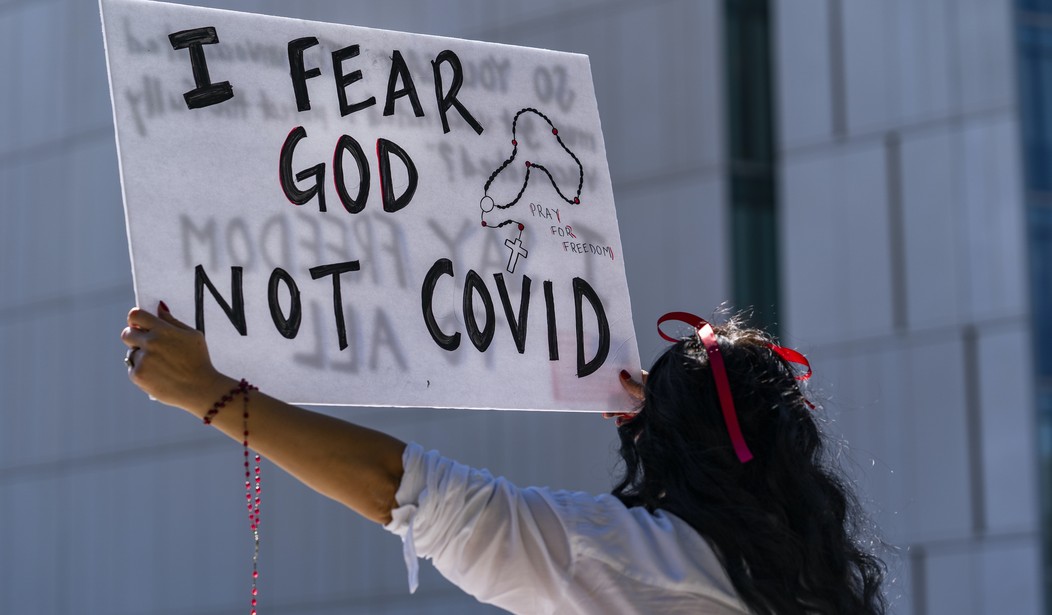“Do people know how rare this is?” said one doctor after this news broke last night, marveling at the fact that researchers have not only developed effective new antivirals to treat a novel disease but have repurposed two already existing drugs to do so. Last year a study showed that dexamethasone, a common steroid, helped patients with severe COVID whose oxygen was low. Now a new randomized study of COVID patients in Brazil has found a meaningful effect on outcomes for unvaccinated people with symptoms when treated with fluvoxamine, a close cousin of Prozac.
And although it’s the biggest study so far to find benefits from fluvoxamine, it’s not the first. Small trials in the U.S. and France also found evidence that the drug made a difference to people infected with the virus.
Which means the state of play on treating COVID looks like this. You can go get an IV infusion of monoclonal antibodies at the hospital for $2,000. You can wait for Merck’s new antiviral pill, molnupiravir, to be approved and spend $700 for a course of that. Or you can have your doctor prescribe fluvoxamine, which costs four bucks for a 10-day regimen and is already available in every pharmacy in America.
Seems like a big deal.
Among nearly 1,500 Covid patients in Brazil given either fluvoxamine or a placebo, the drug reduced the need for hospitalization or prolonged medical observation by one-third, the study found. It was published in The Lancet Global Health.
Some patients struggled to tolerate the drug and stopped taking it, the study said, raising a question among outside scientists about whether they had yet identified the ideal dose. But among those who had largely followed doctors’ orders, the benefits were even more striking. In those patients, the drug reduced the need for hospitalization by two-thirds and slashed the risk of dying: One Covid patient given fluvoxamine died, compared with 12 given a placebo.
Eleven percent of patients who got fluvoxamine after developing symptomatic COVID needed hospital care versus 16 percent of patients in the control group. That doesn’t sound like much — one in 20 recipients of the drug should benefit — but when you scale it up to millions of symptomatic cases you get tens of thousands of people who’ll avoid the ER, not to mention dying, by taking the drug.
How does a drug that’s been prescribed for decades to treat OCD and depression work to limit severe illness caused by a novel virus? Scientists … don’t know. Their leading theory is that the drug has an anti-inflammatory effect on cells that helps to regulate stress response; that may prevent the immune systems of some COVID patients from going haywire and attacking their own organs as the disease progresses. Another theory is that the drug reduces the blood clotting that happens in some COVID cases because fluvoxamine inhibits platelet activation. A third theory is that it increases the amount of melatonin in plasma, which does, er, something.
Whatever the explanation, we now have three studies from respected research groups indicating a benefit.
#COVID19 early therapy with #Fluvoxaminehttps://t.co/bYqlbLKL4t
▪️32% ⬇️in hospitalization/prolonged ER visits overall
▪️ If >80% adherent ⬇️66% reduction hosp/ER
▪️ If >80% adherent ⬇️91% reduction in deaths (1 vs 12)
▪️ 26% didn't tolerate FLVX, 18% didn't tolerate placebo. pic.twitter.com/F8NH2YXSzb— David Boulware, MD MPH (@boulware_dr) October 27, 2021
Note the last line. Some people have difficulty tolerating fluvoxamine because it can cause nausea, which means it may be inferior to monoclonal antibodies for certain patients. For most, though, it could be just as effective against COVID as that drug is at a tiny fraction of the cost:
Clinical 🥡 (cont):
-the effect size NNT=20 to prevent hospitalization is similar to that of monoclonal antibodies & inhaled budesonide
-fluvoxamine is a cheap, widely available medication. Even a relatively small decrease in hospitalizations would be a big deal worldwide
9/— Nick Mark MD (@nickmmark) October 28, 2021
An obvious question: If this cheap, ubiquitous antidepressant helps fight COVID, should we assume that other cheap, ubiquitous antidepressants do so as well? That’s too much of a logical leap, writes Jeremy Faust, but we should start looking into it.
Even among drugs that are in the same class as fluvoxamine, which is a selective serotonin re-uptake inhibitor (SSRI), it’s likely that some may have a helpful effect while others won’t. That’s because researchers believe that the reason the drug might help Covid-19 patients has nothing to do with its chemical properties that treat depression. Instead, it is believed that the drug’s anti-inflammatory properties may be the key. Some SSRIs have similar anti-inflammatory properties, and others do not.
The real game-changer here potentially is for poorer countries, of course, many of which still have low vaccination rates. Monoclonal antibodies and molnupiravir are pricey (although Merck’s doing what it can to solve that problem) but fluvoxamine is readily available and can begin saving lives immediately at little cost.
I’m keen to see how people in U.S. who’ve been treating ivermectin and hydroxychloroquine as secret cures for COVID react to the news. In one sense, you’d expect them to embrace it. If the point of celebrating those other drugs is to downplay the risk from COVID and/or the need to get vaccinated, now they have a new, scientifically approved rationale in their arsenal. I don’t think they will embrace it, though. The hype around ivermectin and hydroxychloroquine is only partly about the studies that purported to find those drugs effective against COVID. Partly too it’s about proving the experts wrong when they insist that only therapeutics endorsed by the medical establishment can possibly work against COVID, a factor that’s missing in the case of a drug like fluvoxamine that’s being embraced by that same establishment. As inane as it sounds to say, ivermectin and hydroxycholorquine have “populist cred” that fluvoxamine doesn’t. I bet it ends up being excluded from the list of grassroots miracle cures. At least until Trump says something approving of it.








